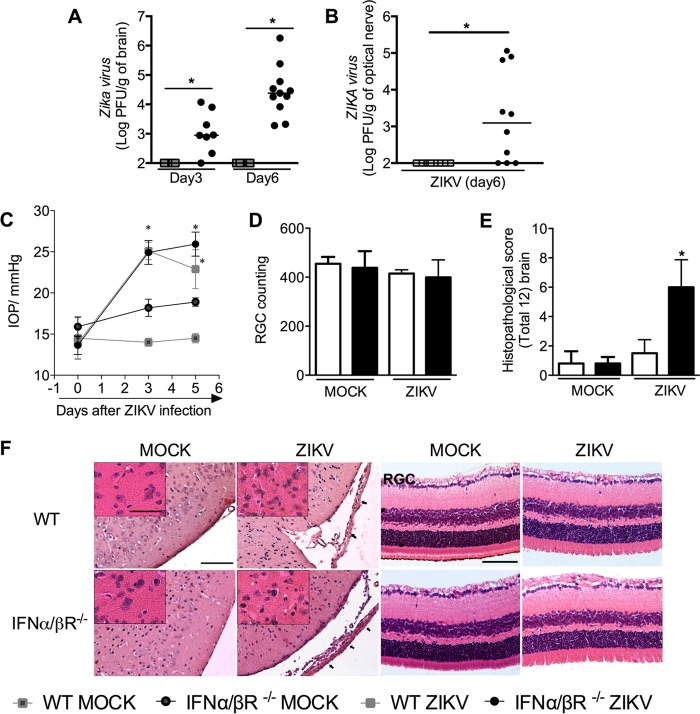N-Methyl-d-Aspartate (NMDA) Receptor Blockade Prevents Neuronal Death Induced by Zika Virus Infection
Zika virus (ZIKV) infection is a global health emergency that causes significant neurodegeneration. Neurodegenerative processes may be exacerbated by N -methyl-d-aspartate receptor (NMDAR)-dependent neuronal excitoxicity. Here, we have exploited the hypothesis that ZIKV-induced neurodegeneration can be rescued by blocking NMDA overstimulation with memantine. Our results show that ZIKV actively replicates in primary neurons and that virus replication is directly associated with massive neuronal cell death. Interestingly, treatment with memantine or other NMDAR blockers, including dizocilpine (MK-801), agmatine sulfate, or ifenprodil, prevents neuronal death without interfering with the ability of ZIKV to replicate in these cells. Moreover, in vivo experiments demonstrate that therapeutic memantine treatment prevents the increase of intraocular pressure (IOP) induced by infection and massively reduces neurodegeneration and microgliosis in the brain of infected mice. Our results indicate that the blockade of NMDARs by memantine provides potent neuroprotective effects against ZIKV-induced neuronal damage, suggesting it could be a viable treatment for patients at risk for ZIKV infection-induced neurodegeneration. IMPORTANCE Zika virus (ZIKV) infection is a global health emergency associated with serious neurological complications, including microcephaly and Guillain-Barré syndrome. Infection of experimental animals with ZIKV causes significant neuronal damage and microgliosis. Treatment with drugs that block NMDARs prevented neuronal damage both in vitro and in vivo These results suggest that overactivation of NMDARs contributes significantly to the neuronal damage induced by ZIKV infection, and this is amenable to inhibition by drug treatment.
Authors
Vivian V Costa; Juliana L Del Sarto; Rebeca F Rocha; Flavia R Silva; Juliana G Doria; Isabella G Olmo; Rafael E Marques; Celso M Queiroz-Junior; Giselle Foureaux; Julia Maria S Araújo; Allysson Cramer; Ana Luíza C V Real; Lucas S Ribeiro; Silvia I Sardi; Anderson J Ferreira; Fabiana S Machado; Antônio C de Oliveira; Antônio L Teixeira; Helder I Nakaya; Danielle G Souza; Fabiola M Ribeiro; Mauro M Teixeira
External link
Publication Year
Publication Journal
Associeted Project
Microbiology or Immunology
Lista de serviços
-
As antisense RNA gets intronic.As antisense RNA gets intronic.
-
Androgen responsive intronic non-coding RNAs.Androgen responsive intronic non-coding RNAs.
-
Conserved tissue expression signatures of intronic noncoding RNAs transcribed from human and mouse loci.Conserved tissue expression signatures of intronic noncoding RNAs transcribed from human and mouse loci.
-
The intronic long noncoding RNA ANRASSF1 recruits PRC2 to the RASSF1A promoter, reducing the expression of RASSF1A and increasing cell proliferation.The intronic long noncoding RNA ANRASSF1 recruits PRC2 to the RASSF1A promoter, reducing the expression of RASSF1A and increasing cell proliferation.
-
Antisense intronic non-coding RNA levels correlate to the degree of tumor differentiation in prostate cancer.Antisense intronic non-coding RNA levels correlate to the degree of tumor differentiation in prostate cancer.
-
Insight Into the Long Noncoding RNA and mRNA Coexpression Profile in the Human Blood Transcriptome Upon Leishmania infantum Infection.Insight Into the Long Noncoding RNA and mRNA Coexpression Profile in the Human Blood Transcriptome Upon Leishmania infantum Infection.
-
Long non-coding RNAs associated with infection and vaccine-induced immunityLong non-coding RNAs associated with infection and vaccine-induced immunity
-
Comparative transcriptomic analysis of long noncoding RNAs in Leishmania-infected human macrophagesComparative transcriptomic analysis of long noncoding RNAs in Leishmania-infected human macrophages
-
SARS-CoV-2 Selectively Induces the Expression of Unproductive Splicing Isoforms of Interferon, Class I MHC, and Splicing Machinery Genes.SARS-CoV-2 Selectively Induces the Expression of Unproductive Splicing Isoforms of Interferon, Class I MHC, and Splicing Machinery Genes.

